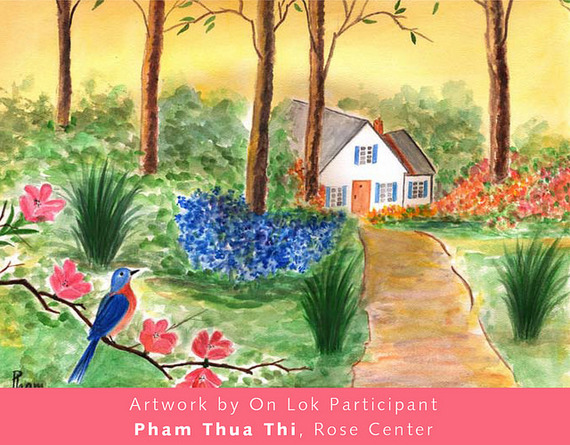Four women are gathered around a table playing mah-jong. Most of them are over 85 years old, some are close to 100. Their age-spotted hands quickly toss out the die, their eyes focused on the green felt board.
Nearby, a larger group of mostly Chinese American seniors, many in wheelchairs, is seated in a semi-circle around a large flat-screen TV watching a Chinese music artist perform. In an adjoining physical therapy space, a handful of elderly folks are doing their daily exercises, pedaling on modified stationary bicycles as a rehabilitation aide stands by. In another wing of the center, a physical therapist leads several seniors in a water therapy session in a small swimming pool.
It's a typical afternoon at the Gee Center in downtown San Francisco, which provides a wide range of care and activities for elderly participants. But unlike many who receive services at senior care facilities, all of the seniors at the center will return home at the end of the day, transported via a fleet of turquoise shuttles. For those who need it, a prepared dinner and a fresh load of laundry will accompany them back home, and aides are on hand to help the participants settle in for the night.
The Gee Center is one of seven similar senior care centers in the Bay Area. Run by an organization known as On Lok Lifeways, the centers provide comprehensive care to seniors who would otherwise be eligible for traditional nursing home care.
In addition to providing skilled nursing care and transportation to and from the center, On Lok also provides meals and dietary services, activities, on-site physical therapy and rehabilitation, mental health care, case management, emergency transportation, medical and dental care. There's even a chaplain on staff to aid participants with spiritual matters and end-of-life discussions. The Gee Center also partners with nearby schools to have seniors and local students spend time together creating neighborhood art projects.
The center first opened its doors in 1971 in the heart of San Francisco's Chinatown, where a group of concerned citizens had been looking for a senior care solution for their elders. "At the time, when patients had an acute episode, they would see a doctor and then would go either to a nursing home or a hospital," said Grace Li, On Lok, Inc.'s newly appointed Chief Executive Officer.
Now in its 45th year, the organization was one of the first adult day health care programs in the nation. In the 1980s, On Lok expanded its services to include full medical care, with primary care physicians on-site. This opened the door to receive Medicare and Medi-Cal funding through a new long-term care financing system known as capitation. Medicare and Medi-Cal provide fixed monthly payments for each participant, and in exchange, On Lok is responsible for providing the full range of health care services, including nursing home and hospital care.
"It's about taking care of people during the day in a more supervised and clinical setting and helping people head back to their communities and families and have their other needs met at home," said Li.
In addition to allowing seniors to stay in the communities where they've lived for years, it provides services to boost participants' quality of life that wouldn't be found in a traditional nursing home or adult day care setting, Li points out. Participants can come into the center as often as they wish, and most come in at least two days per week.
An interdisciplinary team of doctors, nurses, occupational therapists and transportation services oversees each On Lok participant. Each team meets regularly to develop personalized care plans for their charges. A prime example of the depth of services the organization provides comes from a recent participant who was hospitalized with fleabites. The woman's On Lok social worker knew that her dog had fleas, and suggested they have the animal flea-dipped to prevent further hospitalizations.
"There's no insurance code for that situation, but we have the flexibility... to treat the root cause instead of just the symptoms," Li said.
In another case, a participant was hospitalized and had no one to take care of her cat. Her On Lok Lifeways social worker moved quickly to arrange care for the woman's beloved pet while she was in the hospital.
"Other programs don't or can't do that," Li said.
"We think about the impact of how important that animal might be to that person. You have to step back and think about how all these component parts together really can contribute to the success of a person aging - their quality of life, their health status, their desire to live in the community," she said.
But On Lok isn't the only senior care center operating under this alternative model. The organization is based on a health care program known as Program of All-inclusive Care for the Elderly, or PACE. When On Lok Lifeways was founded, it was one of the first of its kind in the country and the first in California, but today there are more than 120 organizations operating PACE programs in 32 states. And Li said the program is poised to expand further, as a growing number of organizations in numerous states have shown interest in adopting PACE.
That may be because it's proven so cost-effective, not only for participants but for health care providers. Organizations operating under the PACE model bear the financial risk for each participant, so they have even more incentive to provide the highest quality care.
"For us, it's about making sure that patients get what they need, and overall it ends up saving money," said Li. "We're preventative and we're proactive, because you can't have waste and you can't have misuse of resources."
This article was originally published on Caring.com. Read the original article here.

